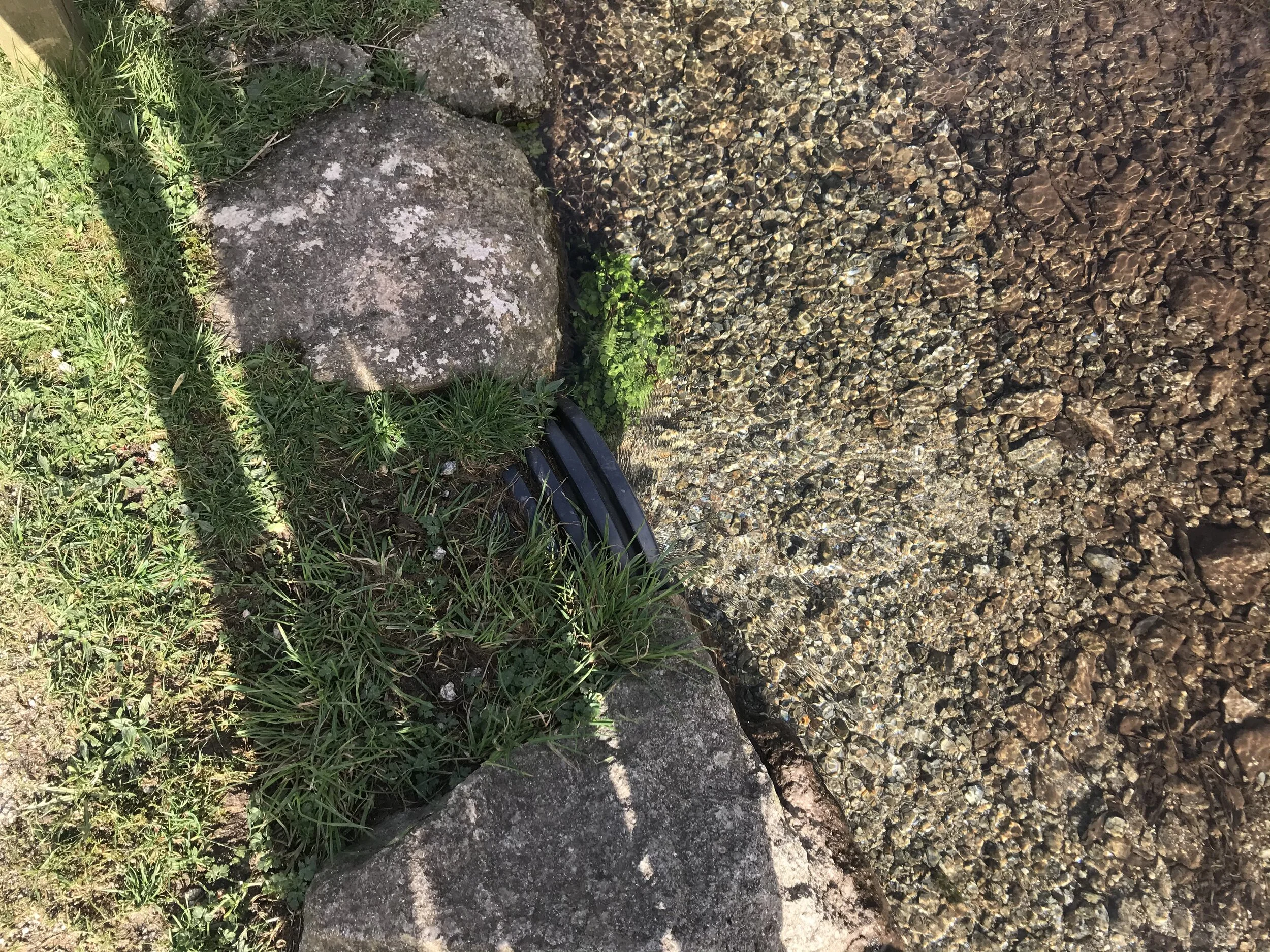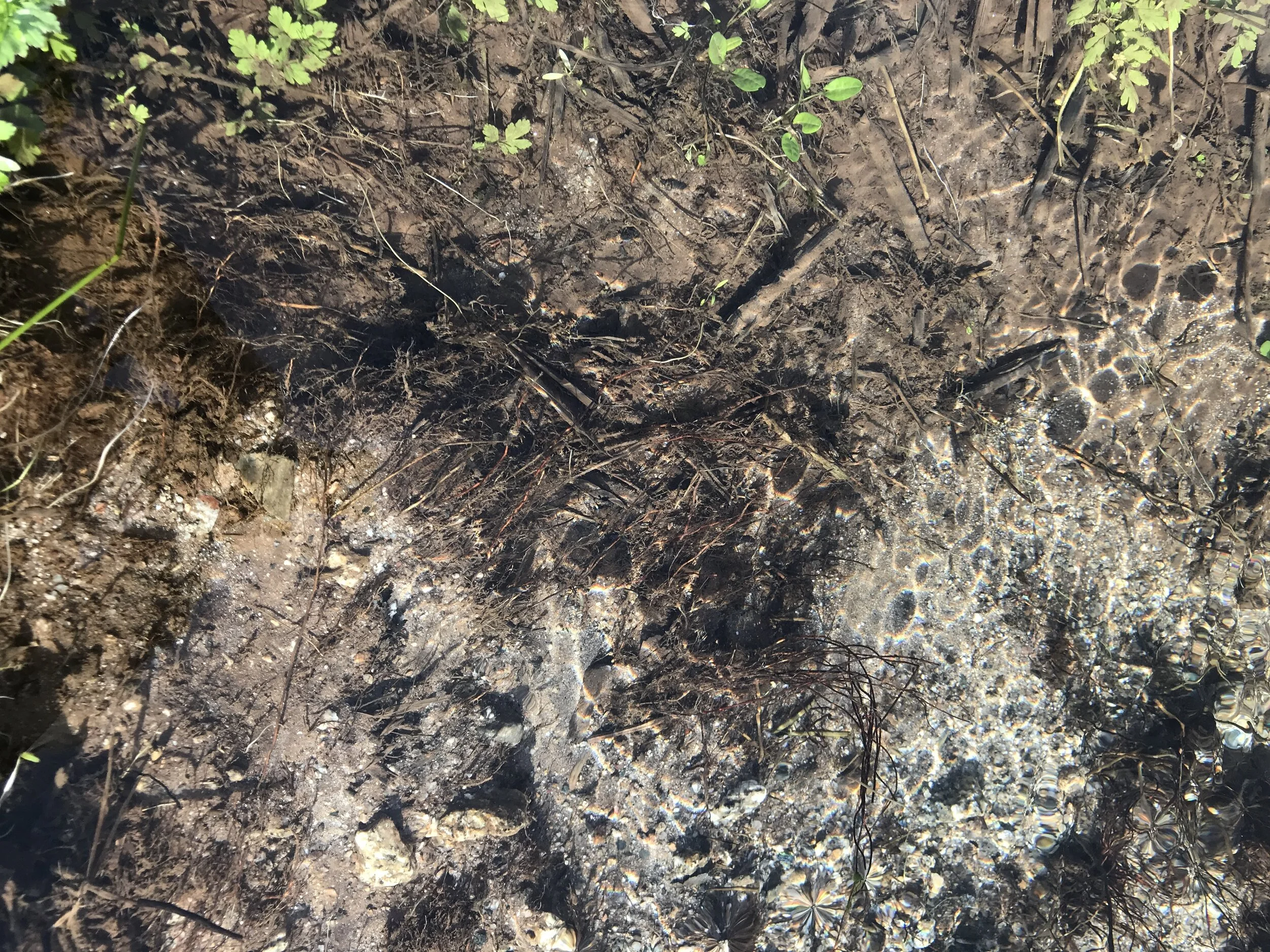WEIRD SHADOWS
The culvert installed under the path that cuts the river in half is too narrow for the amount of water trying to get through. In response, the river has become complex, forming a network of pools and channels before veering into boggy woodland to take the long way round. Given the straightening and modification of the Red River’s course, this mazy error of water feels refreshing, and, with its involuted margins, speeds and depths, rich in biodiversity. While Rob stoops over the culvert making a recording, I sit on a stone and find myself looking into one of the channels the river has made as it runs parallel to the path before turning away.
The sun comes out. The river is so heavily transparent and full of subtle motion, it reminds me of Seamus Heaney’s River Moyola ‘Pleasuring beneath alder trees’ in his poem ‘A New Song’ (Wintering Out), a sensuality I’d not previously associated with the Red River. The slightly faster flow of water through the section I’m looking into has swept particles of silt and leaf debris off the underlying bed of pale granite sand, making it clear why this area of Newton Moor is known locally as The Sands. The water’s about half a metre deep, but seems so much deeper because of its clarity and flushness with the bank. Mica glints; white roots of parsley and water mint sway speculatively in the current.
Across the sandy bed, spots of shadow grow out of some unseeable origin, fill to a maximum size, and then shrink into an unseeable point of disappearance. The shadows seem to have a life of their own, each one following the other in a roaming trajectory, so that four of five, in different states of growth and diminishment, track along the same arc. Each has a corona of light around its circumference as if it were a sun in a state of total eclipse. For a moment, I can’t tell what’s casting them. They seem disembodied, utterly strange and instinct with their own life. And then I get it: they’re being cast by eddies dimpling the surface, refracting and concentrating light into an encircling brilliance around each shadow, like fluent magnifying glasses whose focus is the edge and not the centre of the object. As the eddies form upstream, so the shadows grow; and as they unwinds into a soft gorge of water mint, they disappear. I watch for an eternity hemmed round with time, pushing the linear journey of the day away with their soft reoccurrences. They seem to share a fixed amount of shade between themselves across the light-filled water, so that their appearance and disappearance, their swelling and shrinking, are inextricably linked. Without beginning or end, their entrances and exits depend on infinitesimal instigations and dissipations of turbulence.
The more I let the shadows occupy me and my associative mind speculate through them (they are ova surrounded with sperm; they are storms on Jupiter; they are dark sun spots), the more the sand they travel over glitters. Let go, I think; let it rinse you clear: they are not a perfect metaphor for something—ideal knowledge, being, flux, soul, ‘spots of time’, ‘winged life’ or whatever—they are simply shadows cast by transparent water. But I desire to know them. It’s as if I have to let the river exhaust my ability to read these shadows, and yet also to have that history of reading in play, before the river may run clear again in all its altering strangeness, a thing instinct with its own life taking pleasure among the banks and roots of things and texts. ‘I do and undo and redo’, as Louis Bourgeois described her process, until the unlikeliness of my coincidental encounter with these shadows on this planet and in this language becomes apparent to me. I imagine my skull in the river, whitened by the action of sand and water: a clean white sherd of cranium the shadows are playing over. I am barely here.
I don’t turn to look at the horse and rider, but listen to the hooves crushing stones into the path: granite on granite; an immense focused weight. ‘Narcissus so himself himself forsook/ And died to kiss his shadow in the brook.’ Shakespeare’s ‘Venus and Adonis’. Why? My gaze has been disturbed. I can smell the leather and dung, hear the rider greet Rob. Who have I been looking at? Or who has been looking into me? The shadows in the water don’t feel like a what: the elusive connection between their appearance and causal origin has granted them their own agency, their own strange, coiling eyes. No image of my face forms on the surface of the river, yet these blobs and eggs of shadow feel intimately familiar, like mobile facial features remaking my image until it fits; they recognise me in a way I barely recognise myself. I’m strangely caught out in them, as if they had been waiting all my life for me to recognise them, to receive them like a gift, an image of myself I had forgotten was running through me. It feels like my eyes are being washed. St Ludgvan received the gift of microscopic vision and fluent speech when he washed his eyes and drank from the well his prayers made spring from the ground. That was a story I understood the first moment I read it in an old antiquarian reprint of Cornish myths and legends in my early, lonely teens: of course gazing into water would have that effect; you don’t need a transcendent force to make that happen. St Ludgvan’s gift was a vision of heaven immanent in earthly things. Stripped of the reading of a typical Celtic saintly experience of the ‘natural’ world as divine revelation, the story became about the ability to speak fluently as the consequence of an intense encounter with the material world in another scale. Shame the Devil spat in the well and destroyed those luminous gifts.
On reflection, perhaps looking into this beautiful stream is like gazing into the eyes of your own being given back in the shape of silent, fluent energy revealed through a deflection of light. Yet it isn’t you. It’s so much more as you begin to recognise the scale of what the eco-critic and philosopher Timothy Morton calls ‘the mesh’: it’s the sun at an angle striking water swollen by three days of rain entering the eye of someone with the time and inclination to gaze into it. What a set of planetary, geological, meteorological, biological and cultural coincidences. My encounter with the shadows have also helped me come to practical terms with Morton’s concept of ‘ecognosis’ and the ‘weird loop’ between subject and object he develops in the context of the Anthropocene in his book Dark Ecology. Here’s Morton on beauty and its relationship to ecognosis:
‘When you experience beauty, you experience evidence in your inner space that at least one thing that isn’t you exists. An evanescent footprint in your inner space—you don’t need to prove that things are real by hitting them or eating them. A non-violent co-existing without coercion. The basic issue with beauty is that it is ungraspable. I can’t point directly to it and I can’t decide whether it’s me of the thing that is emanating beauty. . . The beauty experience just is narcissism, inclusive of one or more other entities. A narcissism in me that isn’t me, including me and the thing in its circuit: ecognosis.’ (Morton 149)
I think I get it, but like the shadows across the bed of the Red River, his words endlessly loop and coil humans and other entities together as we revolve around the desire to know the unknowability of otherness; to be fascinated and co-exist without ‘hitting’ or ‘eating’ it. I don’t want to grasp him, but to let his text and what it bears upon play through me. When exploring a river that has been hit and eaten by our desire for tin and other metals, a fascination with the strange beauty of its damage and recovery feels necessary. It reminds me of Steve fighting to preserve the dragonflies at Brea adit against the plans of Medway Tin, the company who bulldozed the settling tanks to extract residual tin sands, and then went bust before removing any. His fascination with the intimate scale of dragonflies and damselflies emerging through the meniscus of water in a settling tank is at the heart of his action on behalf of the river. Morton writes: ‘Being interested means I am in charge. Being fascinated means that something else is.’ We need care for the river that grows out of fascination and not interest. We need to experience its particular beauty before it can guide us into its future.


